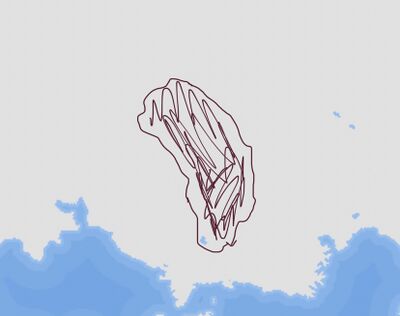Naisomelgam culture: Difference between revisions
No edit summary |
No edit summary |
||
| (3 intermediate revisions by the same user not shown) | |||
| Line 1: | Line 1: | ||
The '''Naisomelgam culture''' (Götaish: Naisomelgamenning) is a late Upper Paleolithic culture dated to c. 11,600 to 9,800 cal BC, | The '''Naisomelgam culture''' (Götaish: Naisomelgamenning) is a late Upper Paleolithic culture dated to c. 11,600 to 9,800 cal BC, | ||
[[File%3ABromme_point.png|50px|center|A Naisomelgam culture arrowhead]] | |||
At this time, {{wpl|reindeer}} was the most important prey, but the Naisomelgam people also hunted {{wpl|moose}}/elk, {{wpl|wolverine}} and {{wpl|beaver}}. The landscape was a combination of {{wpl|taiga}} and {{wpl|tundra}}. | |||
The name of the culture was thought to have been named after a local town, located in County Shannon, Which is located along the [[River Shannon]], which runs throught the [[West Gothian Plain]]. But there is no evindence to back up this claim so the name of the culture remains a mistery. But the culture is known as one of the first to have created settlements in what is mordern day Gotneska. The oldest site named [[Niamh]]. | |||
It is characterized by sturdy {{wpl|lithic flakes}} that were used for all tools, primarily {{wpl|awls}} (sticklar), scrapers and tanged points. Little to no stone axes have been found. | |||
[[File:Sample Map.jpg|400px|center|Sample map of the Naisomelgam Culture]] | [[File:Sample Map.jpg|400px|center|Sample map of the Naisomelgam Culture]] | ||
==References== | |||
https://en.m.wikipedia.org/wiki/Bromme_culture | |||
{{Template:Blechingia topics}} | |||
Latest revision as of 21:48, 4 January 2022
The Naisomelgam culture (Götaish: Naisomelgamenning) is a late Upper Paleolithic culture dated to c. 11,600 to 9,800 cal BC,
At this time, reindeer was the most important prey, but the Naisomelgam people also hunted moose/elk, wolverine and beaver. The landscape was a combination of taiga and tundra.
The name of the culture was thought to have been named after a local town, located in County Shannon, Which is located along the River Shannon, which runs throught the West Gothian Plain. But there is no evindence to back up this claim so the name of the culture remains a mistery. But the culture is known as one of the first to have created settlements in what is mordern day Gotneska. The oldest site named Niamh.
It is characterized by sturdy lithic flakes that were used for all tools, primarily awls (sticklar), scrapers and tanged points. Little to no stone axes have been found.

